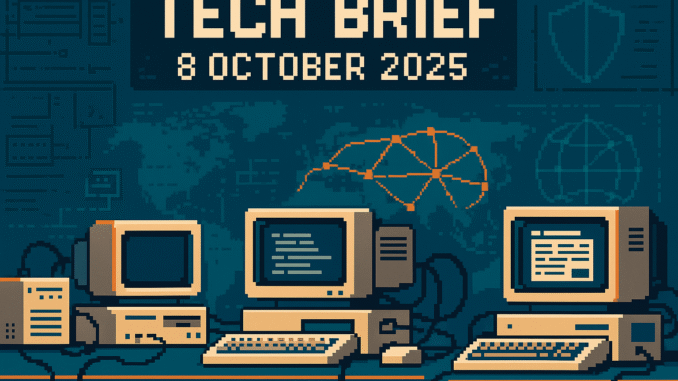
“It was never the software. It was the people behind it.” Tech Brief 8 October 2025 brings hard lessons about trust in the digital world, from the fallout of the Horizon scandal to newly discovered Stasi gaming hacks. Meanwhile, cybercriminals have just put a major Japanese brewery offline. If you missed last time around, catch up here before diving in.
Fujitsu Urged to Pay £700m in Advance Amid Horizon Scandal
“Accountability starts with writing a proper cheque,” says one peer, as Fujitsu faces mounting pressure to offer an interim £700m payment for its role in the Post Office Horizon debacle. This isn’t just corporate clean-up; the demand comes before any formal conclusions from the public inquiry, with campaigners and tech veterans echoing a generational truth: technical problems get fixed, but institutional arrogance lingers. The Horizon system, infamous for ruining hundreds of lives with unexplained accounting errors, became a case study in what happens when faith in digital systems outpaces critical review. The manuals from the late 1990s flagged the very issues at the heart of today’s outcry, but many voices were ignored. Restoring public trust means more than cheques and apologies; it might mean redesigning how government buys, audits, and manages technology. Are lessons ever truly learned, or just looped into the next contract?
Stasi’s Secret Pong: How East German Spies Embraced Video Games
How do you keep a secret police force happy behind the Iron Curtain? Let them build knock-off Pong machines, apparently. A new German exhibition has revealed that the Stasi, the GDR’s infamous surveillance apparatus, reverse-engineered early video games as both technical escapism and a display of domestic prowess. Recovered schematics from state-published magazines outline DIY gaming consoles, assembled from salvaged TV parts and soldered together with the same stubborn determination seen in British bedrooms equipped with Sinclair ZX81s. These machines may look crude now, but their story asks what happens to creativity and play under intense control. The real surprise isn’t their ingenuity-it’s how universal the urge to play, tinker, and modify hardware proved-even in places designed to suppress every hint of subversion. Strange to think the urge to mod a game can cut through barbed wire. Or maybe it’s not so strange at all.
Qilin Ransomware Stops Beer Production at Japan’s Asahi
We all remember when Japanese engineering seemed untouchable, from Sony Walkman tapes to Nintendos built like bricks. Now, Asahi Group’s production lines have ground to a halt, thanks to a cyberattack claimed by the Qilin group. No attempt at historical context here-this is just the new reality for multinationals: even beloved brands aren’t safe when an email goes astray. The vulnerabilities are digital, not physical, and the resilience of a company is measured in backup strategy and incident response plans, rather than clever hardware tricks. If you’re skimming this while waiting on a delivery of Asahi Super Dry, the phrase “supply chain” just got very real. There’s little poetry in a locked hard drive, but the implications for international trade are massive. What happens when bandits can bring a brewery to a stop from a world away?
From the Wayback Machine
On This Day: 1996 – US Postal Service Honors ENIAC
ENIAC, the first general-purpose electronic computer, received a commemorative stamp in 1996 for its 50th anniversary. The machine weighed 27 tons and filled a room at the University of Pennsylvania. Programming ENIAC meant rewiring plugboards, not clicking icons. Its design set the stage for everything from home micros to cloud servers. Even now, engineers dismantling rack servers might pause and remember ENIAC’s giant footprint, its vacuum tube glow, and how innovation begins with patience, bulk, and ambition.
What This Means
Tech Brief 8 October 2025 lands on a single point: digital systems may change, but the need for scrutiny, creativity, and resilience does not. Accountability, whether in software or leadership, is always overdue.
Stay curious, keep your soldering iron ready, and never trust a system that refuses to be questioned.
Missed yesterday’s Tech Brief? Catch up here

Leave a Reply